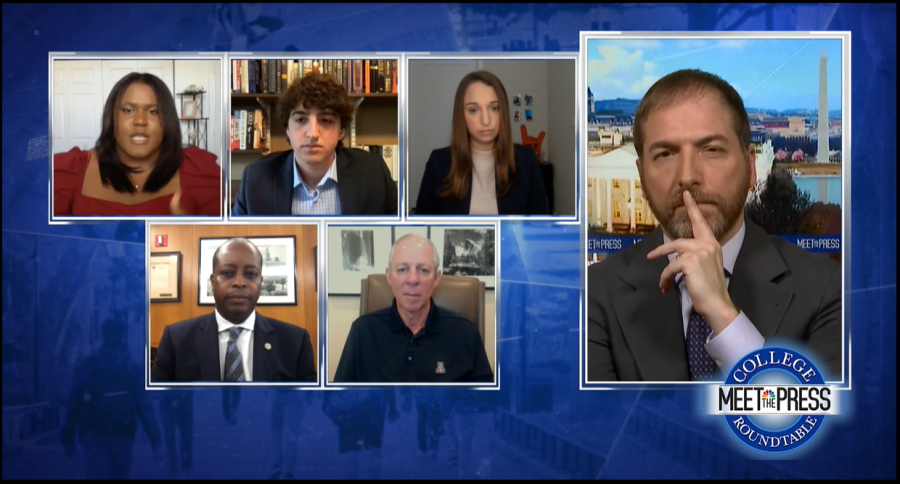University of Arizona President Dr. Robert C. Robbins said he’s prepared to close campus in the fall semester if necessary during an NBC Meet the Press college roundtable discussion Thursday, May 28.
Sami Sparber, a University of Texas at Austin student, asked Robbins how the UA could prevent COVID-19 from spreading on campus due to he large number of students living off-campus and possibly partying.
“That is the major challenge, I think, for us,” Robbins said. “Because we have 45,000 students, only about 8,000 to 9,000 live on our campus, so this is my biggest concern. I think that we have to engage our students.”
RELATED: Campus reentry update: Task force talks combating the spread of COVID-19 on campus
Sparber then asked if Robbins would be prepared to close the campus if there’s a dramatic increase of cases after students return.
“Absolutely, and of course that’s my worst case scenario, that we bring everybody back and everybody’s following the rules,” Robbins said. “And then comes around election time, people let their guard down and we have the second wave coming, which is unavoidable, obviously. But that people aren’t as meticulous to attention to detail as they had been, and we have a massive spike and our hospitals become overwhelmed. Absolutely, we would close the campus.”
On May 27, Robbins and the UA Reentry Task Force discussed the campus possibly reopening in the fall using the “Test, Trace and Treat” plan, which would make current COVID-19 testing available to all members of the UA community.
Incoming Georgetown University student Gabe Fleisher asked Robbins how confident he is in antibody testing, given that the Centers for Disease Control is questioning the accuracy of these tests.
“We work very closely with the CDC and I would agree that most of the antibody tests to date have been inaccurate,” Robbins said. “I know because there have been several third-party validations and our test, it’s 99.6% specific to the COVID-19 novel virus, which means the chance of getting a false positive for our test is one in 3.5 million individuals. The sensitivity is also more than 95%, so we’re very confident we have a very, very accurate antibody test.”
Robbins expressed interest in antigen testing as a screening mechanism.
“The idea would be antigen tests could be done at a lower cost. It’s faster, it’s a point of care. … Those positive tests could then be used to guide us towards testing individuals with RT-PCR, which I think would tell us if that person was infected,” Robbins said. “Then we can go back and contact trace, then we can quarantine and isolate.”
RELATED: COVID-19 testing capacity increases with antigen test
Florida Agricultural and Mechanical University student Aiyana Ishmael asked how transparent the task force process is with students, faculty and staff.
“We think our plan cannot be successful unless we have engagement from not only our student leaders who are on our task force,” Robbins said. “And I just want to add, we’re very fortunate to have Dr. Richard Carmona, who was the 17th surgeon general of the United States, heading up our task force.”
Robbins said a student EMT group, undergraduate, graduate and professional students plus multicultural organizations are all being represented in the process.
“We want to give our students that opportunity to choose,” Robbins said, “and we want to provide the maximum protections and safeguards to give [students], their loved ones, their parents the confidence that we can take care of them in a responsible way.”
Follow Priya Jandu on Twitter









